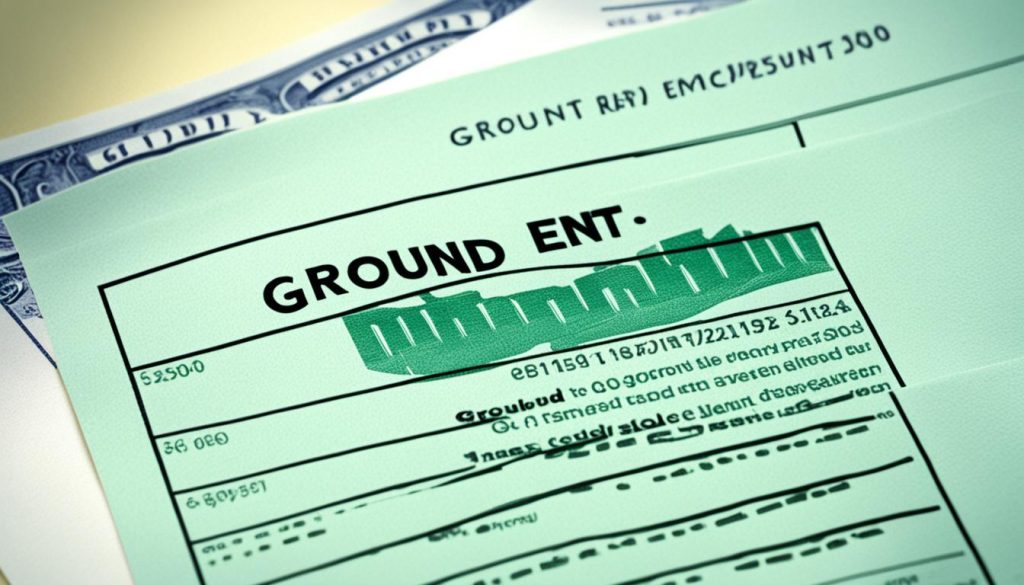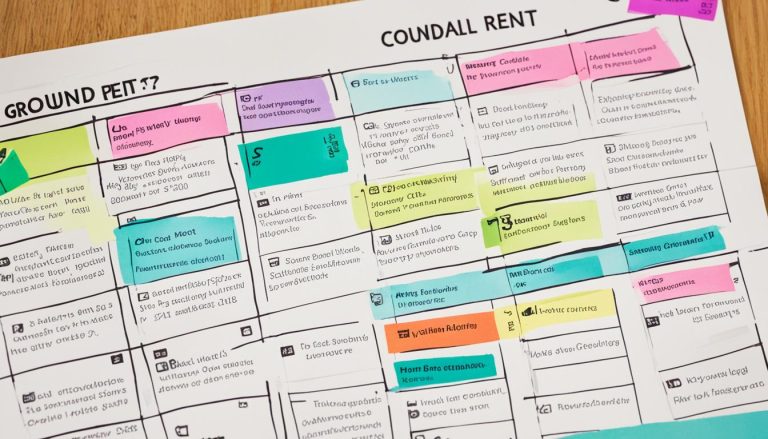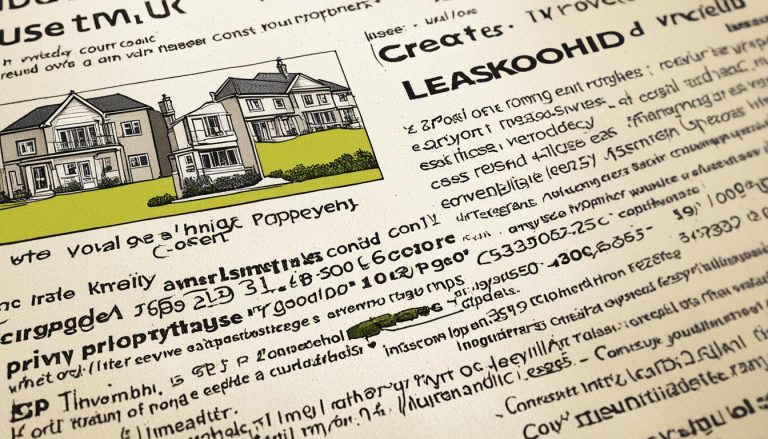Welcome to our informative article where we will explore the concept of ground rent charges on freehold properties in the United Kingdom. If you’re wondering why you have to pay ground rent on a freehold property, you’ve come to the right place. We will delve into the reasons behind this obligation and shed light on the key aspects associated with ground rent.
As a property owner, understanding the intricacies of Why Do I Pay Ground Rent on a Freehold Property is essential. It’s important to comprehend the rights and responsibilities that come with owning a freehold property, especially when it comes to financial obligations like ground rent charges.
In the sections ahead, we will cover various topics related to ground rent, including the historical background, purpose, legal framework, and factors affecting the amount of ground rent. We will also decipher ground rent clauses and explore how it can impact the value of your property. By the end of this article, you will have a comprehensive understanding of the why, what, and how of ground rent on freehold properties.
So, let’s dive in and unravel the mystery of ground rent charges on freehold properties in the UK!
Why Do I Pay Ground Rent on a Freehold Property?
Before we delve into ground rent charges, it is important to understand what freehold property means. Freehold property refers to ownership of both the land and the buildings on it. Unlike leasehold properties, where ownership is for a fixed period of time, freehold properties grant the owner indefinite ownership rights.
When you own a freehold property, you have complete control over both the land and the buildings on it. This means that you are responsible for the maintenance, repairs, and any alterations or improvements to the property.
On the other hand, leasehold properties involve a lease agreement where the property is owned by someone else, known as the freeholder or landlord. Leaseholders have the right to occupy the property for a specific period of time, usually long-term leases ranging from 99 to 999 years. While leaseholders have certain rights and responsibilities, the ultimate ownership of the property lies with the freeholder.
There are significant differences between freehold and leasehold properties, and understanding these distinctions is crucial for property owners. Let’s take a closer look at some of the key differences:
- Ownership: Freehold property ownership is indefinite and extends to both the land and the buildings, while leasehold property ownership is for a fixed period of time.
- Responsibilities: Freehold property owners bear the responsibility for maintenance, repairs, and improvements to the property, whereas leasehold property owners often pay service charges to the freeholder for the maintenance and management of the property.
- Control: Freehold property owners have complete control over their property, including the ability to make modifications or changes as they see fit. Leasehold property owners, on the other hand, may require permission from the freeholder for certain alterations.
- Ground Rent: While ground rent is more commonly associated with leasehold properties, there are instances where certain freehold properties may also have ground rent charges. We will delve deeper into this topic in the following sections.
Property Leasehold vs Freehold: A Comparison
| Leasehold Property | Freehold Property |
|---|---|
| Ownership is for a fixed period of time. | Ownership is indefinite. |
| Responsibilities for maintenance often lie with the freeholder. | Responsibilities for maintenance, repairs, and improvements lie with the owner. |
| Modifications or alterations may require permission from the freeholder. | Owners have complete control over alterations and improvements. |
| May involve ground rent charges. | May or may not involve ground rent charges. |
As a property owner, understanding the difference between freehold and leasehold properties is essential. It impacts your rights, responsibilities, and financial commitments. Now that we have a basic understanding of freehold property, let’s explore the concept of ground rent and its relevance to freehold properties in the United Kingdom.
What is Ground Rent?
In this section, we will explain what ground rent is and how it applies to freehold properties. Ground rent is a periodic payment made by the owner of a freehold property to the owner of the land on which the property is built. Although freehold means owning the property and the land it stands on, ground rent can still exist in specific cases.
The historical context of ground rent can be traced back to feudal times when landowners leased out their land to tenants. Tenants were required to pay rent to the landowner, and this practice has evolved over time into what is now known as ground rent.

Evolution of Ground Rent
Historically, ground rent served as a way for landowners to generate income from their land without transferring ownership. It provided them with a steady source of income while retaining ownership rights over the land. Today, ground rent continues to serve a similar purpose, although the terms and conditions may vary.
Applicability to Freehold Properties
Ground rent can apply to freehold properties in certain cases, often when there are leasehold-like arrangements in place. These arrangements can arise when a property is subject to certain restrictions or covenants that require the payment of ground rent.
It is important for property owners to be aware of any ground rent obligations that may exist, as failure to meet these obligations can have legal and financial consequences. Understanding the concept of ground rent and its applicability to freehold properties is vital for property owners to navigate their obligations effectively.
In the next section, we will delve into the historical background of ground rent, providing further insights into its origins and development over time.
Historical Background of Ground Rent
Understanding the historical background of ground rent is key to comprehending its relevance in the present day. Let’s take a journey back in time to explore the origins of ground rent charges and how they have evolved over the years.
Ground rent has a long-standing history in the United Kingdom, dating back several centuries. Its roots can be traced to the feudal system, where landowners provided lands to tenants in exchange for various obligations, including the payment of rent.
During this period, ground rent served as a form of compensation for the use of the land and was primarily paid in goods or services rather than monetary value.
As societies progressed and economies changed, ground rent gradually transitioned into a monetary form of payment.
The concept of ground rent persisted through the ages, and it became particularly prevalent during the Victorian era with the expansion of cities and the increasing demand for urban development.
Landowners would lease out their land for the construction of residential or commercial properties, retaining ownership of the land while earning an ongoing stream of income through ground rent charges.
The rise of ground rent during this period was fueled by the idea that the value of land would continually increase, making it a profitable long-term investment.
However, the way ground rent was structured began to change, transforming from a percentage-based payment to fixed annual charges.
To provide a clearer understanding of how ground rent charges have evolved, here is a table illustrating the progression:
| Historical Period | Ground Rent Structure |
|---|---|
| Feudal Era | Goods or services as rent payment |
| Victorian Era | Monetary ground rent charges |
| Modern Era | Transition from percentage-based to fixed annual charges |
Today, ground rent continues to play a role in property ownership in the United Kingdom, albeit with variations in its application and significance. Understanding the historical context helps property owners grasp the underlying principles behind ground rent charges and their obligations.
Purpose of Ground Rent
Ground rent serves a specific purpose within the realm of property ownership. Despite owning a freehold property, you may still be subject to ground rent charges and obligations. Understanding the purpose behind ground rent is crucial for property owners.
So, why is ground rent still charged on freehold properties?
1. Historical Context
Ground rent has a long-standing historical significance in the United Kingdom. It originated from the feudal system, where landowners leased their land to tenants in exchange for yearly payments. Over time, this tradition has evolved, and ground rent charges have continued as a way to maintain ties between landowners and property occupiers.
2. Property Maintenance
One of the primary purposes of ground rent is to fund the ongoing maintenance and upkeep of communal areas and shared amenities within a property development. The collected funds can be utilized for various purposes, such as landscaping, repairs, and communal utilities. By imposing ground rent charges, property developers ensure that these essential services are adequately funded, contributing to a well-maintained and enjoyable living environment for all residents.
3. Investment for Landowners
Ground rent can also serve as a source of investment income for landowners. When property developers sell the freehold of a development, they often retain the right to collect ground rent from leaseholders. This allows landowners to generate a steady stream of income from the property, enhancing the overall value of their investment.
By understanding the purpose behind ground rent, property owners can better comprehend their obligations and the benefits they receive from this arrangement. It is essential to recognize that ground rent charges are not arbitrary but serve a fundamental role within the property ownership landscape.

Leasehold-like Arrangements
Although freehold properties are typically not associated with leasehold arrangements, there are situations where leasehold-like arrangements exist, leading to the presence of ground rent. These unique scenarios can impact the obligations and responsibilities of property owners.
In certain cases, a freehold property may have specific clauses or agreements that impose ground rent on the property. This could occur, for example, when a property is subject to a long lease or when there are shared spaces within a development that require maintenance.
These leasehold-like arrangements can introduce a leasehold element in an otherwise freehold property, resulting in the payment of ground rent. While the terms and conditions may differ from traditional leasehold arrangements, the presence of ground rent highlights the importance of understanding the specific details of the property’s tenure.
Let’s explore a few examples where leasehold-like arrangements can lead to ground rent obligations:
- Shared spaces: In developments with communal areas such as gardens, driveways, or recreational facilities, the maintenance and upkeep expenses may be shared among the property owners. In such cases, ground rent can be introduced to cover these costs.
- Historical agreements: Certain properties may have historical agreements or covenants that require the payment of ground rent. These agreements could be remnants of past leasing arrangements or obligations imposed by previous property owners.
- Long leasehold conversions: In some instances, long leasehold properties have been converted into freehold properties. However, specific provisions in the conversion process may retain certain leasehold aspects, including the payment of ground rent.
By understanding these distinctive scenarios, freehold property owners can be better prepared to navigate the complexities of leasehold-like arrangements that involve ground rent.
| Leasehold-like Arrangements | Impact on Ground Rent |
|---|---|
| Shared spaces | Introduces ground rent to cover shared maintenance expenses. |
| Historical agreements | May include obligations for ground rent, remnants of past leasing arrangements or covenants. |
| Long leasehold conversions | Conversion of long leasehold properties to freehold can still retain elements that require ground rent payment. |
Factors Affecting Ground Rent Amount
The calculation of ground rent charges is influenced by various factors that property owners should be aware of. Understanding these factors can help property owners anticipate the amount of ground rent they will be obligated to pay. Let’s explore the key elements that contribute to the determination of ground rent charges:
1. Lease Terms
The terms outlined in the property lease can significantly impact the amount of ground rent. Longer lease durations or leases with specific clauses may result in higher ground rent charges.
2. Inflationary Increases
Many ground rent agreements incorporate inflationary increases. These adjustments ensure that the ground rent keeps up with the rising costs of living over time, which can lead to an increase in the amount payable.
3. Property Valuation
The current market value of the property can influence the ground rent charges. Higher-valued properties often have higher ground rent obligations.
4. Location
The location of the property is another crucial factor. Ground rent charges may vary depending on the desirability and demand for properties in a specific area.
5. Property Type
Different property types may have varying ground rent charges. For example, apartments or properties with additional amenities may have higher ground rent obligations compared to standalone houses.
These factors, among others, contribute to the calculation of ground rent charges on freehold properties. It’s essential for property owners to carefully review their lease agreements and consider these aspects to understand their ground rent obligations effectively. By being aware of the factors affecting ground rent amounts, property owners can better plan their finances and fulfill their obligations responsibly.
| Factors Affecting Ground Rent Amount | Influence on Ground Rent Charges |
|---|---|
| Lease Terms | Higher ground rent charges for longer leases or leases with specific clauses. |
| Inflationary Increases | Adjustments in line with inflation to keep up with rising costs of living. |
| Property Valuation | Higher-valued properties may have higher ground rent obligations. |
| Location | Ground rent charges influenced by desirability and demand in a specific area. |
| Property Type | Different property types may have varying ground rent charges. |
Note: The table above provides a summary of the factors affecting ground rent amounts and their influence on the charges. It is important to refer to individual lease agreements and consult legal experts for specific details regarding ground rent obligations.

Legal Framework for Ground Rent
Ground rent charges on freehold properties in the United Kingdom are governed by specific legal regulations. These regulations establish the rights and obligations of both property owners and tenants in relation to ground rent.
The legal framework surrounding ground rent provides important protections for both parties. It ensures that ground rent charges are fair and reasonable, while also safeguarding the rights of property owners and tenants.
Under the legal framework, property owners have the obligation to pay the agreed-upon ground rent charges to the landlord or freeholder. This payment is typically made on an annual or periodic basis, as specified in the lease or contract.
On the other hand, tenants have certain rights and protections regarding ground rent obligations. These include the right to receive a clear and accurate statement of ground rent charges, dispute resolution mechanisms in case of disagreements, and the right not to face excessive or unfair ground rent increases.
It is important for property owners and tenants to familiarize themselves with the legal framework surrounding ground rent to ensure that their rights are protected and their obligations are fulfilled.
Rights and Protections under the Legal Framework
The legal framework for ground rent provides the following rights and protections to property owners and tenants:
- Clear and accurate statement of ground rent charges
- Dispute resolution mechanisms
- Protection against excessive or unfair ground rent increases
- Right to request information regarding the management of ground rent funds
These rights and protections help maintain a fair and transparent ground rent system, ensuring that both parties can fulfill their obligations and resolve any disputes that may arise.
Legal Framework for Ground Rent
| Aspect of Legal Framework | Explanation |
|---|---|
| Payment Obligations | Property owners are obligated to pay the agreed-upon ground rent charges to the landlord or freeholder. |
| Rights of Tenants | Tenants have the right to receive a clear and accurate statement of ground rent charges and protection against excessive or unfair increases. |
| Dispute Resolution | The legal framework provides mechanisms for resolving disputes related to ground rent obligations. |
Understanding the legal framework for ground rent is essential for property owners and tenants alike. By familiarizing themselves with the rights and protections provided, they can ensure a fair and transparent ground rent system.
Understanding Ground Rent Clauses
Ground rent clauses are an important aspect of property leases and contracts that property owners should be familiar with. These clauses outline the terms and conditions regarding ground rent charges and obligations. By understanding these clauses, property owners can ensure compliance and avoid any potential issues.
Ground rent clauses typically contain information such as:
- The amount of ground rent to be paid, which may be a fixed amount or subject to periodic reviews.
- The frequency of ground rent payments, whether it is monthly, annually, or at other intervals.
- Methods of payment, including acceptable payment methods and deadlines for payment.
- Any penalties or consequences for late or non-payment of ground rent.
- Ground rent increase mechanisms and factors affecting potential increases.
- Terms and conditions for lease renewal or extension.
It is essential for property owners to carefully review these clauses and seek legal advice if needed to fully understand their rights and responsibilities. By doing so, property owners can navigate their ground rent obligations effectively and avoid any potential disputes or issues.
Ground Rent and Property Value
Ground rent can have a significant impact on the value of a property. Property owners should be aware of how ground rent obligations can influence property valuation and the considerations they need to keep in mind.
When it comes to property valuation, ground rent charges are taken into account by potential buyers and valuers. The presence of ground rent can affect the marketability and desirability of a property, as well as the amount a buyer is willing to pay. Understanding the implications of ground rent on property value is essential for both current and prospective property owners.
Factors such as the length of the lease, the ground rent amount, and the terms of the lease can all influence property value. For example, if a property has a long lease term and a low ground rent charge, it may be seen as more attractive and valuable to potential buyers. On the other hand, a property with a short lease term or high ground rent charges might be perceived as less desirable and could affect its market value.
Considerations for Property Owners
Property owners with ground rent obligations should consider the following:
- Lease Length: The remaining length of the lease can impact property value. As the lease term decreases, the value of the property may also decrease.
- Ground Rent Escalation: Some lease agreements include clauses that allow for an increase in ground rent charges over time. Property owners should understand how these escalations can affect property value in the long run.
- Leasehold vs. Freehold: While ground rent is typically associated with leasehold properties, there are instances where freehold properties may also have ground rent obligations. Property owners should clarify their rights and obligations regarding ground rent to make informed decisions.
- Future Costs: Property owners should take into account the potential future costs associated with ground rent charges. They should assess whether these costs are manageable and align with their long-term financial goals.
By considering these factors, property owners can make informed decisions about their ground rent obligations and ensure they are maximizing the value of their property.
| Factors Affecting Property Value | Impact on Property Value |
|---|---|
| Lease Length | Longer lease term can increase property value, while shorter lease term can decrease value. |
| Ground Rent Amount | Lower ground rent charges can make a property more desirable, while higher charges can impact marketability. |
| Lease Terms and Conditions | The terms of the lease, such as ground rent escalations and restrictions, can influence property value. |
Conclusion
In conclusion, understanding why you pay ground rent on a freehold property in the UK is essential for property owners. We have explored the historical background of ground rent, its purpose, and the legal obligations it entails. By gaining a comprehensive understanding of ground rent, property owners can navigate their responsibilities with confidence.
Ground rent charges exist as a way to maintain the rights and obligations associated with property ownership. Despite being a freehold property owner, you may still encounter situations where ground rent is applicable, especially in leasehold-like arrangements. These charges can vary depending on factors such as location, property value, and lease terms.
Being aware of your ground rent obligations and the specific terms outlined in your contracts is crucial. It is essential to review and understand ground rent clauses as they can impact your financial responsibilities and property value. By adhering to the legal framework and fulfilling your ground rent obligations, you are ensuring the long-term stability and value of your freehold property.
By having a comprehensive understanding of ground rent and its role in freehold property ownership, you can navigate your obligations effectively. Take the time to educate yourself about ground rent charges, its historical background, and the legal framework governing it. By doing so, you can protect your investment and make informed decisions regarding your freehold property.
FAQ
Why do I pay ground rent on a freehold property in the UK?
Ground rent charges on freehold properties in the UK can exist due to historical reasons or leasehold-like arrangements. It is important to understand the specific terms and conditions of your property ownership to determine the reasons behind the ground rent payments.
What is a freehold property?
A freehold property refers to full ownership of both the property and the land it is built on. Unlike leasehold properties, freehold ownership does not involve a landlord or lease terms. Property owners have complete control and responsibility over the property.
What is ground rent?
Ground rent is a payment made by the owner of a leasehold or freehold property to the landowner. It is a long-standing tradition in the UK, dating back to the feudal system. Ground rent payments acknowledge that the landowner still holds some interest in the property, even if the property itself is owned outright.
What is the historical background of ground rent?
Ground rent originated from the feudal system, where land was owned by lords or monarchs who allowed tenants to use the land in exchange for various obligations, including rent. Over time, ground rent has evolved into a system where property owners pay an annual or periodic fee to the landowner.
What is the purpose of ground rent?
The purpose of ground rent is to acknowledge the landowner’s ongoing interest in the property. Ground rent also provides a source of income for the landowner and helps to maintain a relationship between the landowner and the property owner.
Are there leasehold-like arrangements for freehold properties?
While freehold properties typically do not have leasehold arrangements, there are instances where leasehold-like arrangements exist. For example, some developments may have common areas or shared amenities, where property owners are required to pay ground rent to contribute towards the maintenance and upkeep of these areas.
What factors affect the amount of ground rent charged?
Several factors can influence the calculation of ground rent, including the value of the property, the length of the leasehold-like arrangement, and any provisions in the lease or contract governing the ground rent payments. Property owners should review their specific terms and conditions to understand the factors affecting their ground rent amount.
What is the legal framework for ground rent?
Ground rent is governed by specific legal regulations to protect the rights and interests of both property owners and tenants. These regulations outline the rights and obligations of both parties and provide mechanisms for dispute resolution if any issues arise regarding ground rent payments.
What should I know about ground rent clauses in my property lease?
Ground rent clauses are often included in property leases or contracts. It is vital to review these clauses carefully to understand the terms and conditions of your ground rent obligations. These clauses may specify the amount of ground rent, payment frequency, and any provisions regarding the increase or review of ground rent over time.
Can ground rent affect the value of my property?
Yes, ground rent can have an impact on the value of a property. Potential buyers may consider the ground rent obligation when determining the value of a property. Higher ground rent charges or unfavorable lease terms may affect marketability and the overall value of the property.






